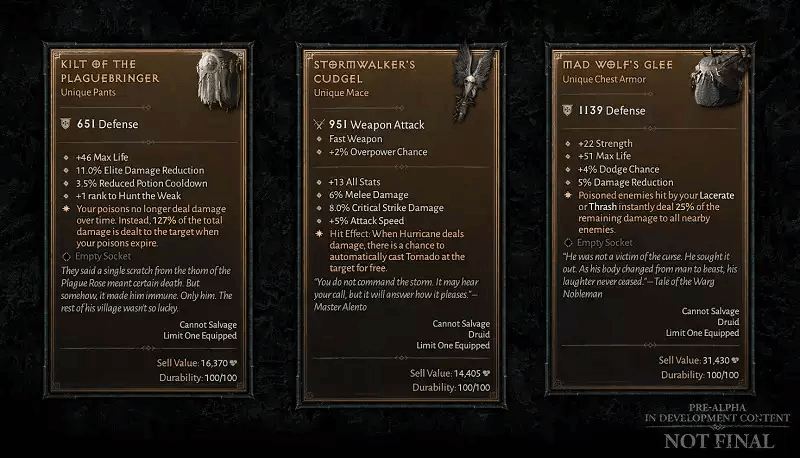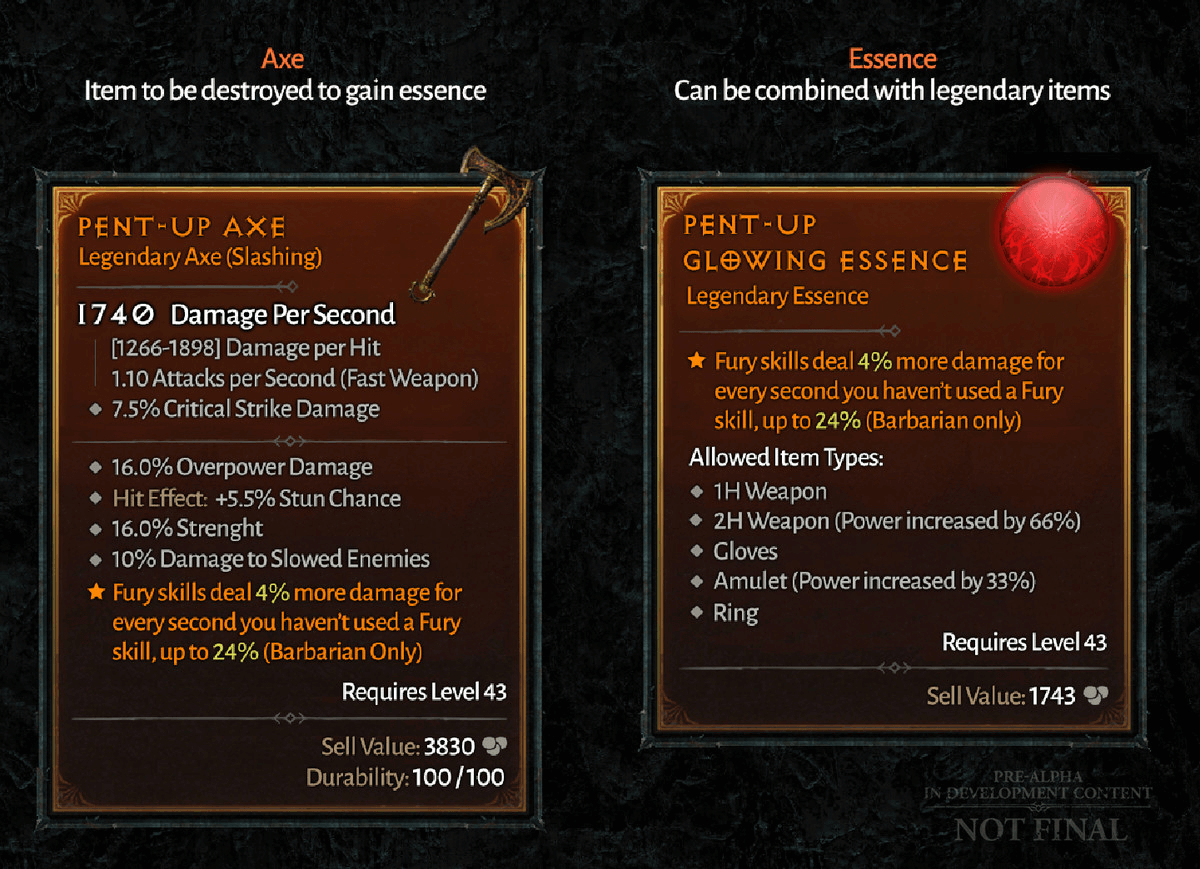Diablo 4 Crafting Systems Guide
Crafting is an essential aspect of Diablo 4, allowing players to create powerful gear and upgrade their existing equipment. With the new crafting system in Diablo 4, players will have more control over the items they create and upgrade. Whether you are a veteran Diablo player or a newcomer to the franchise, this crafting system guide will provide you with all the information you need to master the art of crafting in Diablo 4.
Artisan List
When you start playing Diablo 4, you'll be able to unlock different artisans who can help you with crafting and upgrading your gear. One of the earliest artisans you can unlock is the Blacksmith, who's great at crafting armour and weapons. He can even upgrade your existing gear, making it stronger and more effective. Plus, if you have any unwanted gear lying around, the Blacksmith can salvage it for crafting materials.
At level 20, you'll also be able to unlock the Jeweller, who specialises in crafting jewellery items like amulets and rings. He can upgrade your jewellery and gems too, and even socket or unsocket them if needed.
If you're into potions, you'll love the Alchemist. This is a new addition to the Diablo franchise, and they'll be the one to handle all your potion crafting needs. You can upgrade your health potion by gathering materials and craft elixirs that provide various benefits and effects. The Alchemist can also create incense, which can be used for certain rituals in the game.
Lastly, the Occultist is a crucial artisan who can help enhance your gear and items in many ways. He can enchant your equipment, modify the stat rolls, and even craft Sigils that are necessary to access Nightmare Dungeons.
With the Occultist, you can also extract and imprint Legendary Aspects onto Rare or Legendary gear, enabling you to customise your character's powers and create gear with immense power. The Artisan system in Diablo 4 is designed to provide you with a fun and immersive crafting experience that's sure to be rewarding.
Crafting materials
If you're wondering how to get your hands on crafting materials in Diablo 4, there are a bunch of ways to do it. For example, you can loot Diablo 4 Gear from enemy or boss drops, complete quests, or crack open crates and chests. And there are different types of materials, ranging from common ones to rarer ones like Magic, Rare, and Legendary items. 
Let's take a look at some specific examples. You might find Gallowvine, a herb that enhances the effects of elixirs, or Howler Moss, which is prized for its physical and vital properties. Biteberry is a bitter and tough berry that has defensive and vital properties, while Reddamine is a fungus with physical and vital qualities. You might also come across Blightshade, a poisonous lily found in swamps, or Lifespan, a berry that contains potent toxins and can make you sleepy. If you're lucky, you might even stumble upon Angel Breath, a rare and precious type of lily-of-the-valley that serves as a highly effective alchemical catalyst, or Fiend Rose, an extremely rare herb that alchemists consider to be the ultimate catalyst.
In addition to these plants, there are also animal parts like Demon's Heart, which is a valuable substance that comes from demons' bodies and has multiple uses. Paletongue is an extract from evil humans' mouths, while Grave Dust is obtained from undead remains, bones, or wrappings for necromantic alchemy. Crushed Beast Bones, on the other hand, are bones that enhance physical properties and come from slain animals.
Ores are another type of crafting material. For example, Iron Chunk is a common ore used to improve weapons and jewellery, while Silver Ore is a rare metal prized for its beauty and potency against dangerous creatures. Scattered Prism is an even rarer crafting material found in very large bodies.
Finally, there are skins, which are used for garments, armour, and hound toys in Sanctuary. Iron Rawhide is a rough leather, while Superior Leather is a more flexible, rugged leather used for high-quality garments and armour.
When it comes to salvaging, you can find some pretty rare and powerful materials. For example, Forgotten Soul is a legendary material found in ore veins during Helltide that can be used to improve sacred and ancestral items. Abstruse Sigil is a legendary material from jewellery made of fragments from storied relics and talismans with unusual properties, while Coiling Ward is a legendary material from armour made of fragments from storied armour with unusual properties.
Baleful Fragment is a legendary material from weapons made of shards from storied weapons with unusual properties. And if you salvage weapons and armour, you might get Veiled Crystal, a rare material that's used to alter latent magic and redirect energy. Sigil Powder, on the other hand, is obtained by salvaging nightmare Sigils with the Occultist and is used to create relics that invite peril for greater challenges and rewards.
How to get legendary items?

If you want to get your hands on legendary items in Diablo 4 beta, there are a few methods you can try. One of the best ways is by doing Quests and Bounties. Bounties are side quests that offer great rewards, including legendary items. They can be done on any difficulty level, but doing them on higher difficulties will increase your chances of getting better drops. Don't forget to be prepared before taking on Bounties to increase your chances of success.
Another way to farm legendary items is by clearing Dungeons and defeating Bosses. You can get up to three legendary items after completing a Dungeon run, so it's worth doing. Even if the legendaries you get are at a lower level, keep them as you can use them to upgrade the stats on your current gear.
Participating in random events and challenges is another effective way to get legendary items. After completing these events, you will be rewarded with chests containing legendary items. These items can help you defeat enemies and progress through the game.
You can also exchange your Murmuring Obols for randomly generated items. Obols are dropped by doing world events on your map, and you can accumulate a good amount of them by speaking to NPCs or waiting for a random event to show up. Speak to Lizveth in Kyovashad to exchange your obols for items.
Finally, you can try gambling or rerolling your stats on golden gear to get the stats you want. This can be done at the Blacksmith by using the “Enchanting” option to reroll one or two stats on a piece of golden gear. However, this method can be quite costly, so it's recommended to only use it if you have a surplus of diablo 4 gold and are willing to take the risk.
Conclusion
In conclusion, Diablo 4 promises to be an exciting addition to the franchise, with its immersive world, engaging gameplay, and robust crafting system. While there is some news on Diablo 4 Dungeons Guide, players can look forward to exploring the game's Diablo 4 World Boss Ashava each with their unique challenges and rewards. With the knowledge gained from this crafting system guide, players can confidently tackle the dangers that await them in the world of Diablo 4.



